The 51st State of Canada, Eh? No Thanks.
Some are having fun with Donald Trump's trolling of Canadian Prime Minister Justin Trudeau on Truth Social about making Canada our 51st State. Be careful what you wish for.
It was said in jest but irritated many people north of the 49th parallel in the Dominion of Canada. At 5,525 miles, the US-Canada border is the longest undefended border in the world.

You probably know the story. Trump announced stiff tariffs on Mexico and Canada for failing to control their borders with the US adequately. Canada’s highly unpopular Prime Minister, Justin Trudeau, made a beeline to Mar-a-Lago for dinner with Trump and others. True North, a conservative-leaning media outlet in Canada, outlines the Mar-a-Lago encounter.
U.S. President-elect Donald Trump jokingly told Prime Minister Justin Trudeau that if he didn’t like his proposed tariffs on Canadian imports that the country could become the 51st US state and Trudeau could reign as its governor.
Trudeau attended Trump’s Mar-a-Lago estate in Florida late Friday to discuss the incoming president’s pledge to impose a 25% tariff on all Canadian imports once he takes office in January.
Fox News reported that according to two sources present at the dinner, the prime minister told Trump that such hefty tariffs on all Canadian imports “would kill the Canadian economy.”
Trump reportedly responded by saying that “If Canada can’t survive without ripping off the U.S. to the tune of US$100-billion a year, then maybe Canada should become the 51st state. . .”
A few of us who’ve closely followed Canada and its elections over the past couple of decades provided cautionary advice at some of the Trumpian hubris and trolling on display: be careful what you wish for. Even in the current political environment, where Canada’s opposition Conservative Party is out-polling the ruling Liberal Party by nearly 2:1, combining Canada’s four left-leaning parties - Liberals, the National Democratic Party, the Bloc Quebecois (Quebec’s separatist party), and the Green Party - paints a more realistic picture. More about that later.
But that’s not the only reason the idea is worth no more than a brief chuckle.
Canada is a mess right now. Its dollar is worth about 75 cents compared to the US dollar, its economy is in recession. Inflation, housing prices, and immigration are out of control, and alarmingly, Canadians are killing themselves through government-sanctioned assisted suicide at rates ten times higher than Americans. Their government-run healthcare system features staffing shortages and long waits for non-urgent care. Like us, they’re running big deficits.
I know Canada very well and love my northern neighbors. Not only am I a former Chair of the Canadian-American Business Council, but my association with Canada goes back to my first foray as a Civil Air Patrol cadet, who spent most of July 1974 traversing the country and staying in the homes of Royal Air Cadet families as part of an International Air Cadet Exchange Program. It is one of the most beautiful places on earth and brimming with the nicest people. I’ve been back countless times and visited most provinces at least once, from Yukon to Newfoundland.
July 1974 was a fascinating month. President Richard Nixon was in the final stages of the Watergate scandal, which led to his resignation the following month. Our small US delegation was accompanied by British Air Cadets, whose country was in the throes of a crippling coal strike. Canadian Prime Minister Pierre Trudeau (yes, father of the current PM) was leading his party in another election that featured a genuine threat of Quebec seceding. It all made quite an impression on this young man from Washington, Oklahoma, population 400 (at the time), who’d never been north of Kansas and didn’t know a lick of French.
Canada’s dollar was worth more than the US dollar at the time. A murmur of anti-Americanism, never far below the surface, bubbled up a few times, especially after US Senator Henry Jackson (D-WA) called Canadians “blue-eyed Arabs” over the high prices they charged for oil. The US was still reeling from the 1973 Arab oil embargo, which Canada, a major energy producer, took full advantage of.
In the Civil Air Patrol orientation session at Washington’s Key Bridge Marriott (my first trip on an airline and to DC), we were directed not to talk about Watergate, or politics in general, with our hosts. Of course, we did. We all openly discussed our respective political travails, making for fascinating and delightful conversations and learning much. My interest in politics soared.
My next major foray with Canadians would be in Istanbul, Turkey, in 1995. As Secretary of the Senate, I attended a meeting of the Inter-parliamentary Union (IPU), the international organization of national legislators, to negotiate a change in their schedules so Members of Congress could attend. They skipped attending since the end of the Cold War and the dissolution of the Soviet Union. Canada, in particular, wanted us back to help mentor dozens of emerging democracies.
Member of Parliament Sue Barnes, a Liberal from London West, Ontario, took me under her wing, making introductions and opening doors. I was welcomed as an extra member of their delegation. They supported my efforts, which only partially bore fruit. I could win a schedule change, but no Members of Congress would still participate. Then, Speaker Newt Gingrich felt the IPU wasted time and money. Congress eventually withdrew from the organization.
As Secretary, I also supervised an office arranging bilateral, bipartisan leadership CODELs (official congressional delegation excursions). Happily, I accepted an invitation from US Sen. Frank Murkowski (R-AK), our delegation chair, to join him and his colleagues at their meetings aboard an Alaskan ferry with a brief diversion by rail from Skagway, Alaska, to Whitehorse, Yukon. The discussions were robust, especially over a new “Cuban Liberty and Democratic Solidarity Act” (Helms-Burton), recently signed by President Clinton. It not only strengthened the US embargo over Cuba but punished those “trafficking” property once held by US Citizens but seized by Cuban communists.
Canada was then and remains a significant trading partner with Cuba. Our Canadian friends did not like the new law and expressed their dissatisfaction forcefully.
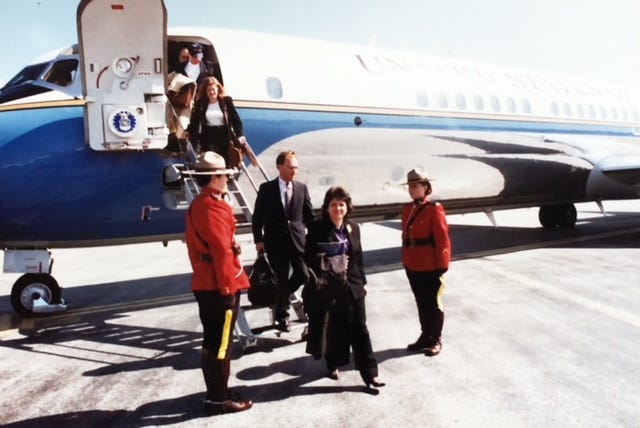
The funny thing about Canada is that they follow our politics more closely than many Americans do. Most Canadians might do better on our citizenship test than most Americans.
And they’ve long been nervous about the relationship. Their teaching of the War of 1812 was that Canada, then part of the British Empire, was invaded by the US (but they assumed no responsibility for burning the Capitol in 1814). Canada was a British colony until the Confederation was formed in 1867. The British Monarch is still their head of state. The King is represented by a “Governor General” with a lovely residence in Ottawa down the street from Stornaway, the US Ambassador’s residence. Most Ontarians and Quebecers, even those from the Maritime Provinces, will profess more affiliation with Europe (especially Britain and France) than the US.
And talk about the US annexing or taking over Canada has happened before.
It’s not hard to understand why. We’re the 800-pound gorilla thrashing about next door, our 340 million population dwarfing theirs of 38 million, 90 percent of whom reside within 100 miles of the US border. Our economies are interdependent, totaling almost $1 trillion in trade annually, from auto parts and lumber to pet food. When America sneezes, Canadians get a cold. So, when trade is disrupted by threats of tariffs or food safety challenges, such as an outbreak of avian flu, it can be very disruptive and expensive. Trump announced a 25 percent tariff on Canadian goods that will make many things more expensive, such as automobiles (car parts can cross the border up to six times before making their way into a final vehicle assembled in Ontario or Michigan). We’ll see if it happens, but it is simply a fact that a lot of drugs and increasing numbers of people are illegally crossing the border - both ways.
We also make fun of each other. I remember the hit song “Don’t Wanna Be an American Idiot” by the Canadian band Green Day. A parody was soon performed by “Weird Al” Yankovic in “Don’t Wanna Be a Canadian Idiot.” It’s genuinely funny.
Another example of Canadian comedy is the John Candy hit movie “Canadian Bacon.” This scene, starring Canadian-born Dan Akroyd, is particularly priceless. The premise is about an American president suffering from low polling numbers being talked into invading Canada.
Canadians also make fun of themselves, too. Canada’s SCTV featured this long-running comedy skit, “Great White North,” starring Canadian-born Rick Moranis (“Honey, I Shrunk the Kids,” “Space Balls,” “Ghostbusters,” et al) as a brother duo, Bob and Doug McKenzie.
Canadians can be defensive about their “culture,” especially when you note that much of their musical and drama talent, from William Shatner to Celine Dion, resides in the United States. Try as they might, it’s still tough for Canada to disassociate itself from the US media influence, much less define its own, even down to the summer-time Canadian Football League with its different rules, populated with many players from the US.
Their efforts to define unique Canadian cuisine could use a little help. I don’t think Poutine is high on Robert F. Kennedy’s list of healthy meals. But they do have Tim Horton’s coffee and excellent beer. And their wine country, with its unique micro-climate near Niagara, is charming. They’re very proud of their ice wine.
America’s icon is the Eagle; Canada’s is the noble Beaver. Our slogan is “life, liberty, and the pursuit of happiness.” Canada’s? “Peace, order, and good government.”
Quick, name the last time a Canadian city won the National Hockey League’s Stanley Cup. That would be the 1992-93 Montreal Canadians. They did come close last year when the Edmonton Oilers lost to the Florida Panthers in the finals. They typically do better in international competitions, such as the Olympics, and most NHL teams prominently feature Canadian players. And having attended NHL games in Calgary and Toronto, I find attending games there more entertaining than in the US, if only for the intensity of their fans.
You can understand why our Canadian friends might be a little sensitive.
But the truth is, we’re great friends. This is best symbolized by 9/11 when scores of flights headed to the US from Europe that morning were diverted to Gatwick Airport in Gander, Newfoundland, whose population doubled in one day. Gander and 16 other Canadian airports, as part of “Operation Yellow Ribbon,” took in 33,000 stranded passengers, many staying in people’s homes. NBC’s Tom Brokaw tells the story in this excellent video about the Canadian-US relationship, including valuable shared history.
And don’t forget the role of Canada’s embassy and ambassador, Kenneth Taylor, in helping hide US embassy personnel during the Iranian hostage crisis of 1979 and shuttling them outside the country. The Academy Award (Best Picture)- winning movie Argo tells a mostly true story.
So, go ahead and enjoy Trump’s trolling. But our northern neighbors have nothing to fear, except maybe from occasional tariff chatter and those never-ending pesky border issues. They’ll be worked out. Canada will have its elections next October, if not sooner, and no doubt Trump will be Issue One: which party leader is best equipped to handle the relationship and protect Canada’s economy?
And here’s what my Trump-supporting friends need to know about Canada. In a good election for Conservatives, the left-leaning parties, especially the Liberals and the New Democratic Party, combined match or outpoll them. This from the polling website 338Canada (338 represents the current number of seats in Parliament, soon to be 343):
So, my friends cast wishful eyes upon our northern neighbors. Enjoy the fun, but think twice, eh?




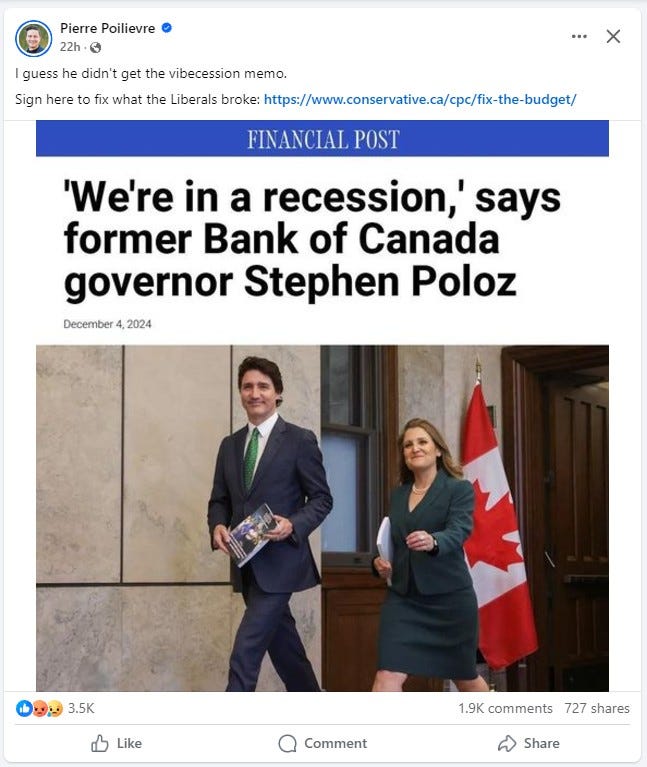
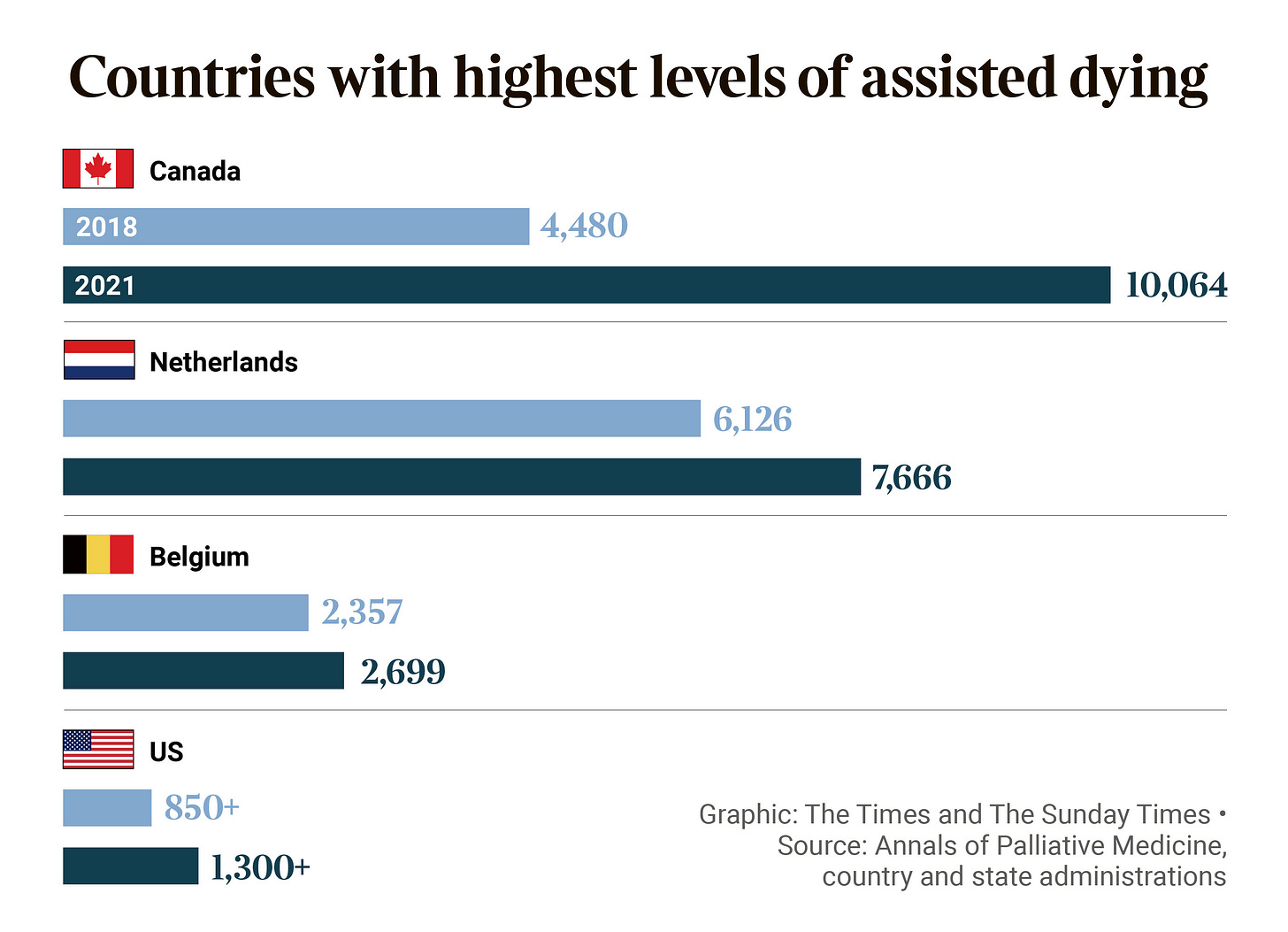
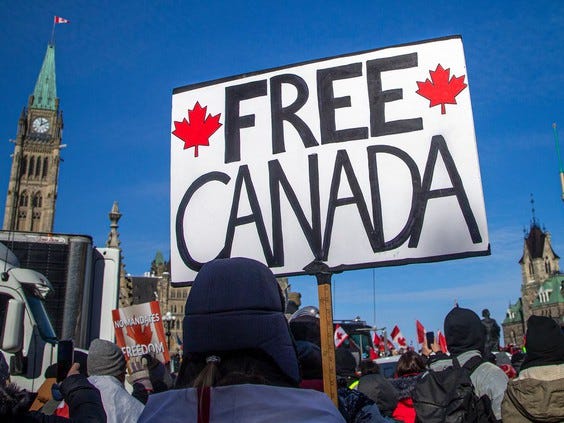
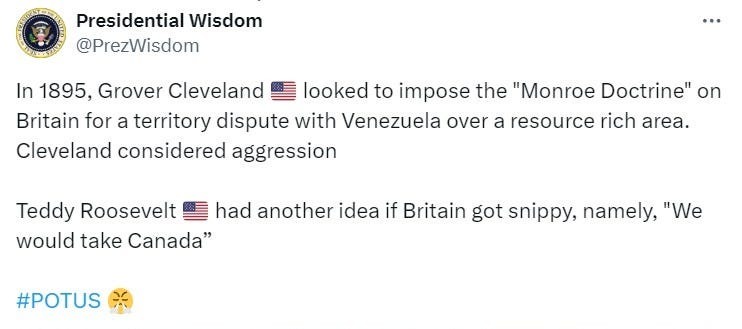
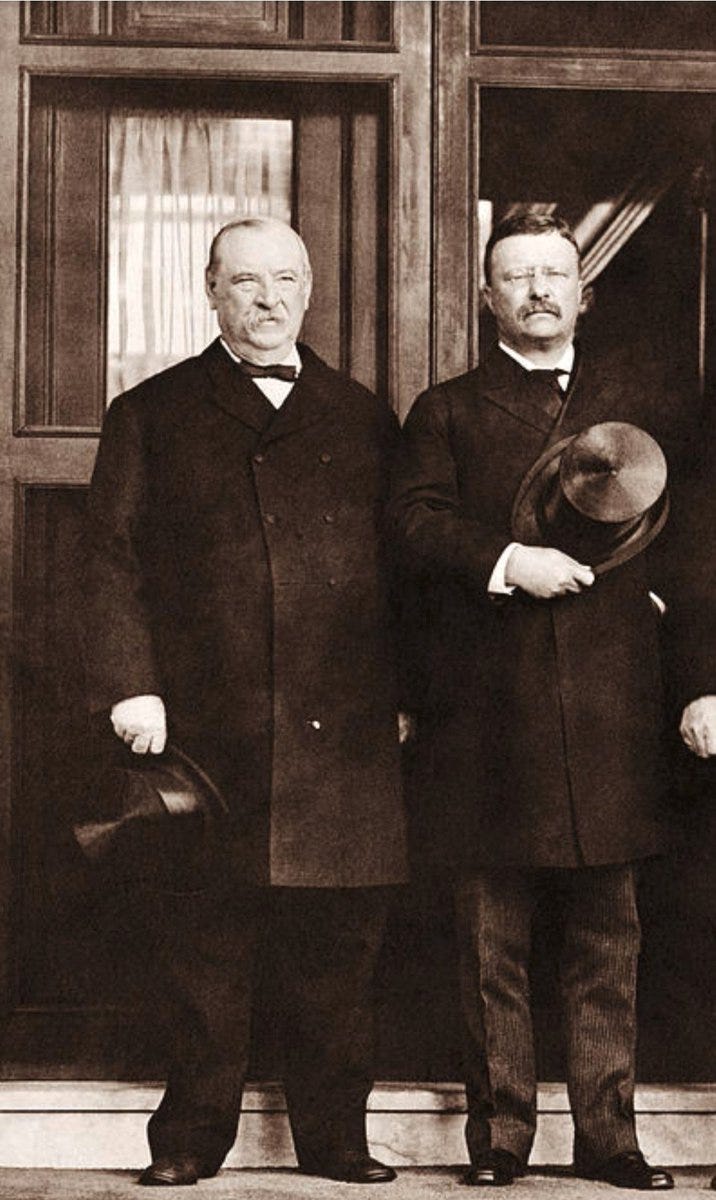


Brilliant article! Thank you Kelly for the breadth and bravery in all your work.
Don't forget South Park Movie's Blame Canada!